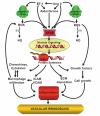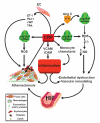Reduction of C-reactive protein and the use of anti-hypertensives
- PMID: 18200816
- PMCID: PMC2350124
Reduction of C-reactive protein and the use of anti-hypertensives
Abstract
Inflammatory processes are increasingly recognized as important participants in the pathophysiology of hypertension and cardiovascular disease. Angiotensin II may be to a large degree responsible for triggering vascular inflammation by inducing oxidative stress, resulting in up-regulation of inflammatory mediators. Inflammatory markers such as C-reactive protein are increased in the blood of patients with hypertension and predict the development of cardiovascular disease. Moreover, C-reactive protein may be a pro-inflammatory molecule under certain circumstances. C-reactive protein and high blood pressure in combination have additional predictive value for cardiovascular outcomes, as they contribute as independent determinants of cardiovascular risk. Therapeutic intervention aimed to reduce vascular inflammation in hypertensive patients has been proposed. Recent lines of evidence suggest that lifestyle modification and pharmacological approaches may reduce blood pressure and inflammation in patients with hypertension. Antagonism of the renin-angiotensin system with the selective angiotensin receptor blockers may improve cardiovascular outcome beyond blood pressure control, by reducing vascular inflammation and remodeling.
Figures


References
-
- Agabiti Rosei E, Morelli P, Rizzoni D. Effects of nifedipine GITS 20 mg or enalapril 20 mg on blood pressure and inflammatory markers in patients with mild-moderate hypertension. Blood Press. 2005b;1:14–22. - PubMed
-
- Agabiti Rosei E, Rizzoni D, Muiesan ML, et al. CENTRO (CandEsartaN on aTherosclerotic Risk factOrs) study investigators. Effects on candesartan cilexetil and enalapril on inflammatory markers of atherosclerosis in hypertensive patients with non-insulin dependent diabetes mellitus. J Hypertens. 2005a;23:435–44. - PubMed
-
- Albert MA, Danielson E, Rifai N, Ridker PM. Effect of statin therapy on C-reactive protein levels: the pravastatin Inflammation/CRP Evaluation (PRINCE), a randomized trial and cohort study. J Am Med Assoc. 2001;286:64–70. - PubMed
-
- Andersen S, Schalkwijk CG, Stehouwer CD, Parving HH. Angiotensin II blockade is associated with decreased leukocyte adhesion molecule levels in diabetic nephropathy. Diabetes Care. 2000;23:1031–2. - PubMed
-
- Arnand IS, Latini R, Florea VG, et al. C-reactive protein in heart failure prognostic value and the effect of valsartan. Circulation. 2005;112:1428–34. - PubMed
Publication types
MeSH terms
Substances
LinkOut - more resources
Full Text Sources
Medical
Research Materials

